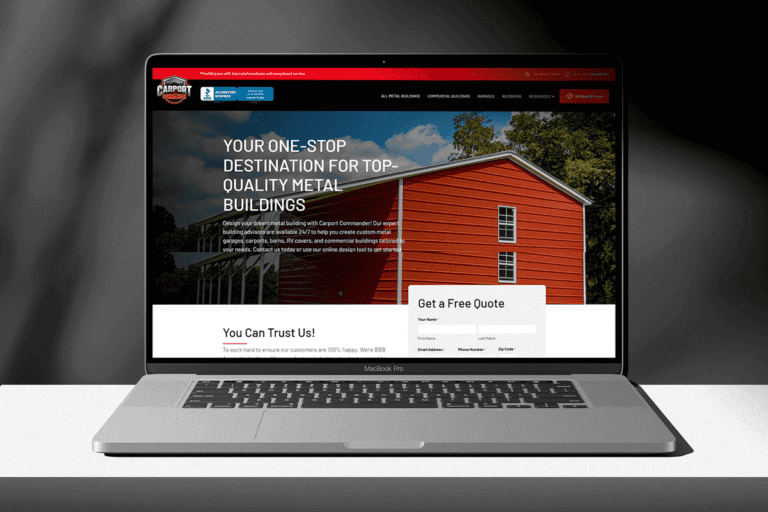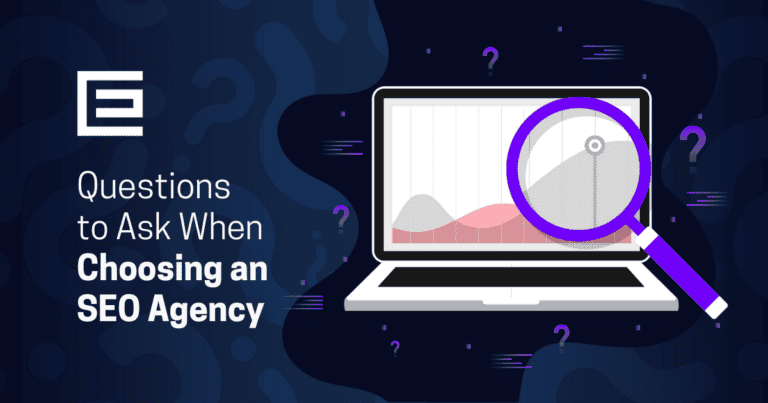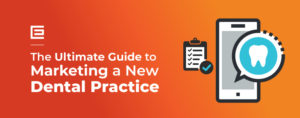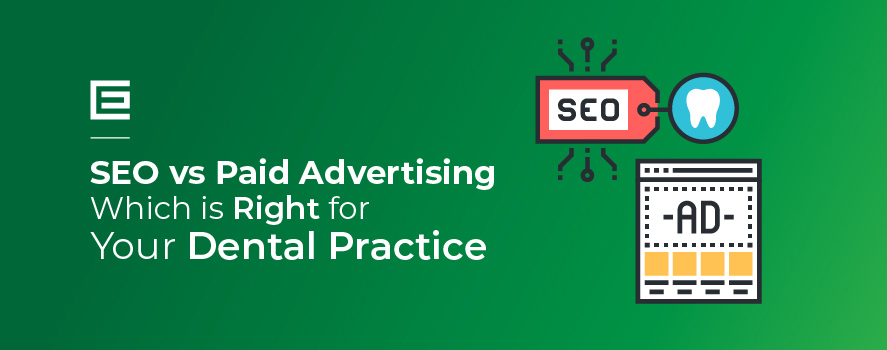
Dental SEO
Search engine optimization (SEO) is the practice of optimizing your website to show up higher in search results so you get more organic traffic. When people search online, they’re more likely to contact the businesses on the first page of search results. If you’re not on the first page, people are less likely to find your dental practice. In fact, research has shown that around 75% of people don’t go past the first page of search results! When your site isn’t optimized for search engines, it’s much harder for people to find you. For local businesses and service providers, local SEO, the act of optimizing your site for local traffic, is extremely important. Research shows that approximately 72% of people that search for a local business, like a dentist, visit a location within 5 miles. Showing up in those searches is key to turning prospective patients into loyal patients.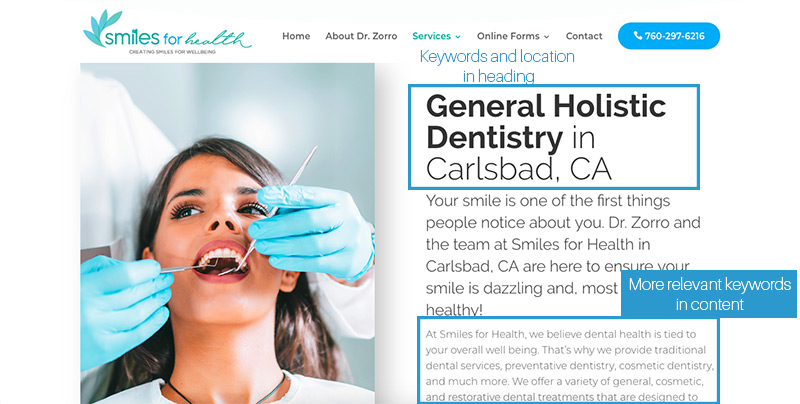
How SEO Works
SEO essentially tells search engines what your website is about so it can show your site to people searching for relevant terms. A lot goes into SEO, but the most common way to optimize your site is with on-site SEO. This involves adding relevant keywords and content to your site so the search engines display it for those keywords. For example, if your dental office specializes in certain treatments like teeth whitening or Invisalign, your digital marketing specialist should make sure your site includes those keywords and that you have content about those topics. This will help your site appear at the top of search results and give searchers valuable information about the treatments you provide.Pros of SEO for Dentists
- SEO is cost-effective. While optimizing your site is an investment, there are no additional costs once it is optimized.
- The effects of SEO are long lasting. A well-optimized site can maintain a high position in the search results for a long time.
- Leads from search results have a 14.2% close rate, while leads from outbound (traditional marketing) efforts only have a close rate of 1.7%.
Cons of Dental SEO
- SEO can take weeks or months to take effect. You will not see results immediately.
- Optimizing your site is an ongoing process. A site will never be 100% optimized, it can only get better optimized.
- Search engines like websites that are updated regularly so consistently adding new content is a big part of SEO.
- This can be time-consuming, especially if you are doing it yourself.
Pay-Per-Click Advertising for Dentists
Pay-per-click (PPC) advertising is another tool commonly used in dental practice marketing. Paid search ads put your practice at the top of search results for relevant keywords.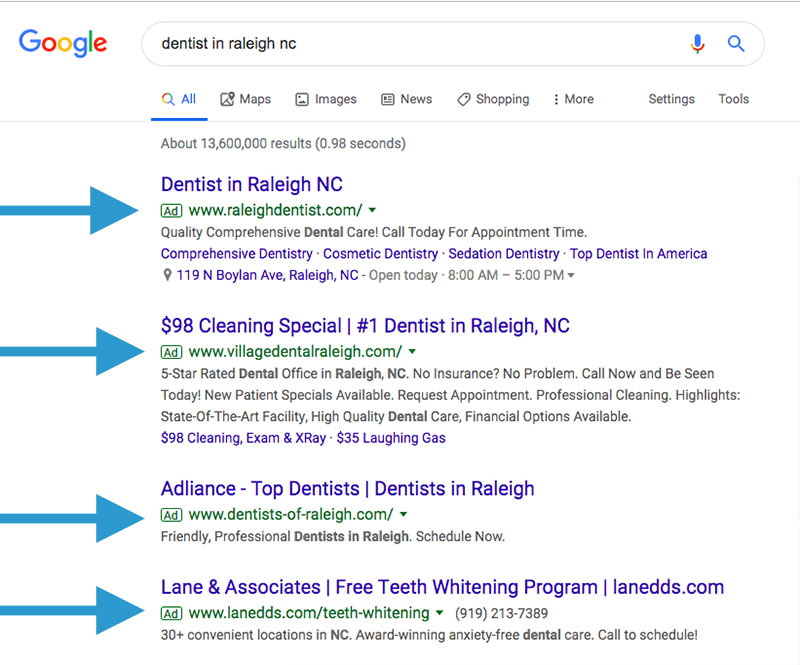
How PPC Works
Instead of traditional advertising where you pay a flat fee to have your ad run for a certain length of time, you pay for each click with the PPC model. You are essentially buying visits to your site as opposed to “earning” them via organic search. While this sounds simple, it’s anything but. In order for ads to appear alongside the results on a search engine, advertisers can’t simply pay more than competitors to guarantee their ads show more frequently or prominently. Instead, advertisers bid on keywords. These auctions are completely automated by search engines and serve to determine the relevance and validity of advertisements. If you successfully win an auction, your ad will be displayed in a particular position on the search results page, depending on keyword relevance and Quality Score.Pros of PPC for Dentists
- Your ads begin running immediately, meaning you should start seeing results relatively quickly.
- You don’t have to worry as much about your appearance in search engine results since your ads are shown at the top of the results.
- You control your ad spend, and it’s easy to scale your campaigns up or down.
Cons of Dental PPC
- You have to pay to get good results and, typically, the more you pay, the better the results.
- Researching and bidding on the ideal keywords can be very time consuming. Managing your budget, measuring returns, adjusting how much you spend, and intelligently managing PPC is basically a full-time job.
- PPC is like a faucet: if you turn it off, the calls stop coming.
How SEO & PPC Work Together for Your Dental Practice
When it comes to dental practice marketing, SEO and PPC work together beautifully. SEO is a long-term marketing strategy for your dental practice. If done properly and maintained, you’ll see steady returns over time. PPC is a way to ensure your ads show up at the top of search results, making them a good way to start getting phone calls from prospective patients immediately. Making both SEO and PPC part of your marketing strategy covers all of your bases, so to speak, and increases your chances of bringing in more patients. PPC ensures you are getting leads and raising your brand awareness while you wait for your SEO efforts to kick in. Putting effort into SEO increases your chances of getting to the top of search engine results and staying there, allowing you to decrease your PPC spend if you need to.Supercharge Your Marketing Efforts with SEO and PPC!
If you’re ready to take your dental practice marketing to the next level, let TheeDigital help. As a Google Partner, our dental marketing team is uniquely qualified in dental SEO and PPC. Call us today at 919-341-8901 or get your free site audit to get started!
Tags: Dental Marketing • Paid Search Marketing • Search Engine Optimization
